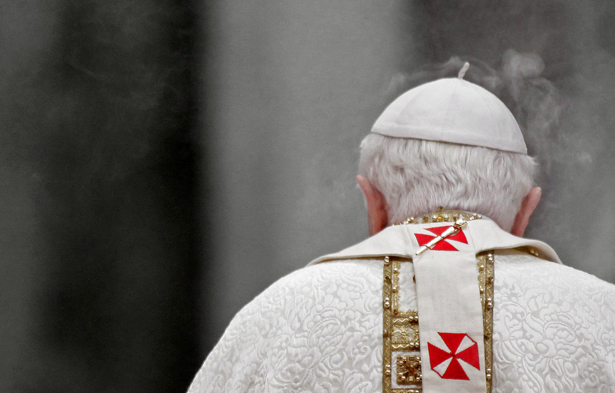
Pope Benedict XVI. REUTERS/Alessia Pierdomenico
No organization survives for two millennia by marching, upright, in a straight line. The history of the Roman Catholic Church is one of a constant struggle to adapt to changes that threatened its authority. In the modern age, it has had to deal with Protestantism and the Enlightenment. It has had to deal politically with democracy and fascism, imperialism and nationalism. Industrial capitalism made its vision of solidarity obsolete. Indifference, secularism and cultural pluralism deprived it of the unquestioning obedience of Catholics themselves.
In this twisted and often tormented tale, two things have been remarkably constant. One is Rome’s claim to ultimate decision in matters spiritual and worldly. The other has been unyielding insistence on the rule of men—in church and by implication in society. Many American Catholics have learned to live in spiritual chiaroscuro by discreetly ignoring church doctrine, as with the practice of contraception. Rick Santorum’s Disney World image of the City of God did not enthuse them. Now the Vatican’s theological bureaucrats, many of whom have never ventured beyond its walls, have confronted American Catholics with a crisis which will render many exceedingly uncomfortable, and drive others to one or another form of defiance.
More than 80 percent of the 57,000 Catholic nuns in the United States are represented by an active and outspoken group called the Leadership Conference of Women Religious. The nuns are not only teachers in the lower grades of Catholic schools, or locked away in perpetual prayer. They are administrators and leaders in social activism, staff Catholic hospitals, teach in colleges and theological schools. Without their presence, much of Catholic institutional life in the United States would be emptied of energy and, pardon the expression, manpower. Factually, they exercise a great deal of women’s power. Legally, however, they are second-class citizens or (poorly) paid servants of the church, obliged to accept the commands of bishops and priests. Extending our non-discrimination laws to the church would revolutionize it—which is why, as in the healthcare debate, the church is at great pains to demand “religious freedom” for itself. The Leadership Conference has been trying, step by step, to loosen the male grip on power in the church. That has brought it into conflict with a significant number of bishops.
Given considerable sympathy amongst the Catholic laity for the nuns, the bishops sought backing in Rome. Since 2008 the Congregation for the Doctrine of the Faith (known in simpler and perhaps more honest days as the Inquisition) has been investigating the conference. Now, without notice to the nuns, it has been placed in receivership. The archbishop of Seattle, seconded by two other bishops, has been given a mandate to reorganize it. The nuns have been charged with sympathy for “radical feminism”—and with taking positions on matters like healthcare legislation different from those of the bishops. One of the organizations specifically cited by the Vatican is Network, which is in the vanguard of Catholic activism for equality and justice. Canon lawyers consulted by the Catholic press have said that there is no appeal provided for in the laws of the church.
Popular
"swipe left below to view more authors"Swipe →The leaders of the conference have imposed silence on themselves until they meet to consider their next steps. The Vatican’s decision was communicated to them by the US Conference of Catholic Bishops while they, the nuns, were in Rome consulting with the Congregation for the Doctrine of the Faith. The Vatican’s lack of straightforwardness is striking. Perhaps a couple of the inquisitors have doubts, and so resorted to administrative brutality to still their own inner dissent.
Some Catholic women have not felt the need to be silent. The Washington Post quotes the Fordham University theologian Jeannine Fletcher on a paradox. “Women can’t be bishops, so there’s a very strange question of whether we can ever voice a response that challenges,” Fletcher says. “If women religious can’t, no women can.” The Post also cites Sister Julie Vieira of the Michigan-based order Servants of the Immaculate Heart of Mary, who said that “our vow of obedience applies to God…. it doesn’t reside in a bishop, a body of bishops or even the pope. For us, that sense of obedience has to do with listening deeply to the call of the spirit.” Is this 2012 or 1517?
Meanwhile, to make the situation more complex, the US Catholic Bishops Conference has disconcerted two prominent Catholics, Representatives John Boehner and Paul Ryan. The conference has strenuously criticized the Ryan budget as deeply unfair to the poor. That is a reversion, welcomed by many Catholics, to the church’s emphasizing issues of social justice and solidarity—and not just obsessing about abortion, contraception, homosexuality. We can remind ourselves that the church is heir to a deep and pervasive tradition of social teaching that was a major element in the New Deal, the American trade union movement, and much that we are proud of in our recent national history.
One of the unintended consequences of the Vatican’s heavy-handedness could be to reinforce the tendency, already quite strong, of American Catholics to think for themselves. Many are indeed deeply distressed that their church should be associated predominantly with catriarchal repressiveness. At the beginning of this week, I attended a symposium at the Woodstock Theological Center at Georgetown University on religion in the presidential election. Woodstock is a distinguished institution and its events are attended by Catholic men and women deeply embedded in our national political life. It was my impression that many were in favor of returning their church to the concerns voiced in the criticism of the Ryan budget. They are likely to be repelled by the treatment of their nuns. In no case are they going to accept uncritically their bishops’ interpretation of their civic duty.


